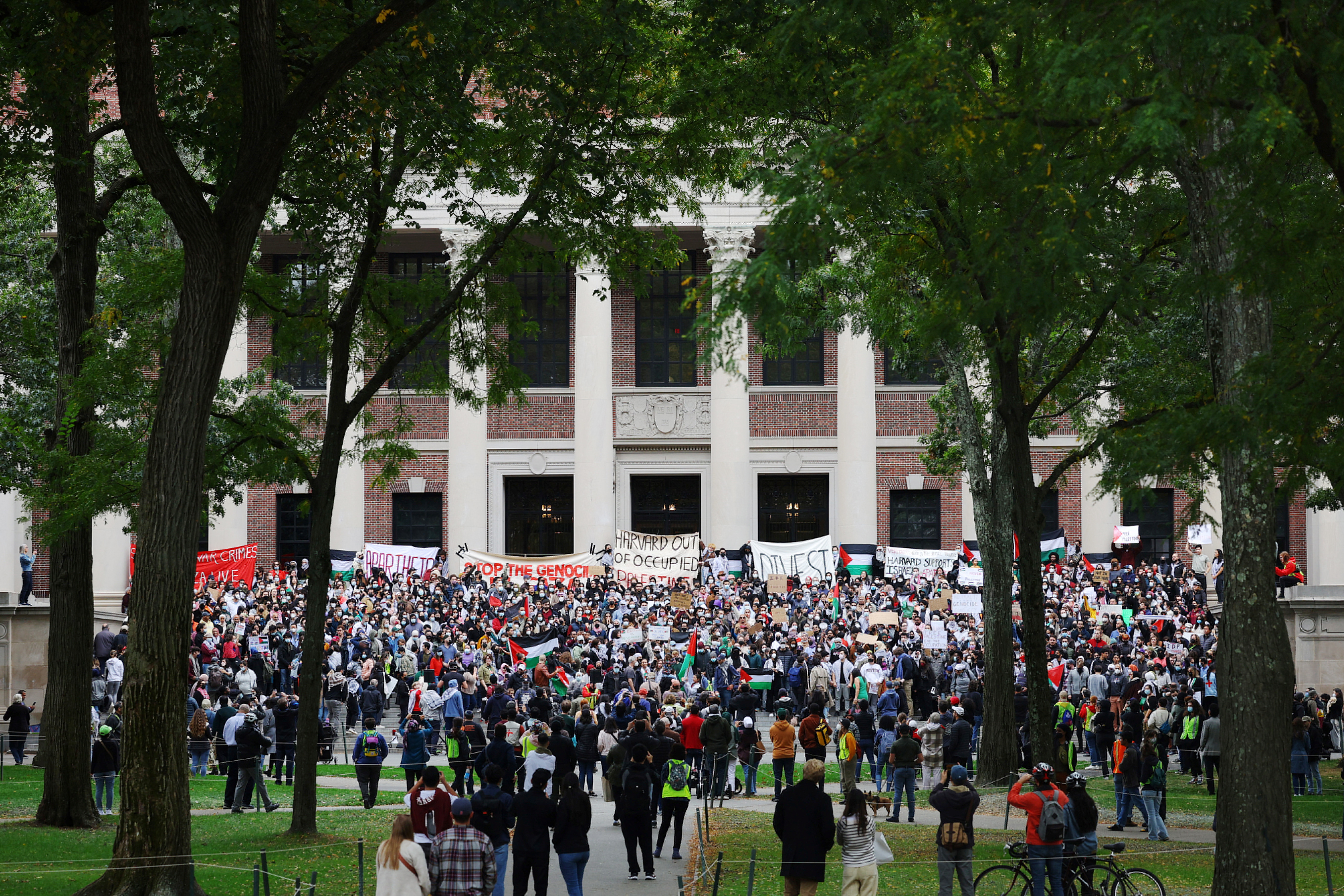
Demonstrators take part at Harvard University in Cambridge, Massachusetts, U.S., October 14, 2023. REUTERS/Brian Snyder Acquire Licensing Rights
NEW YORK, Oct 20 (Reuters Breakingviews) – Wall Streeters are trying to teach universities a lesson, but may provide them with a broader understanding of economics instead. Billionaire investors Marc Rowan and Bill Ackman are enraged over controversial positions on the Middle East at their respective alma maters, the University of Pennsylvania and Harvard. In doing so, they have drawn attention to the unsavory money-go-round in U.S. higher education and provided an opportunity for the system to become a freer market.
Leading American colleges are powered by affluence. The median family income for Harvard students is nearly $169,000, or about 2.5 times the U.S. average. Fewer than 2% of graduates came from poor upbringings and went on to become wealthy, according to Opportunity Insights, a research group at Harvard. Basically, the university is fully aware the rich help the rich stay rich.
Efforts have been made to change, including by rejecting the standardized testing that favors applicants who can, among other things, afford pricey preparation courses. Stockpiles of cash donated by Rowan, Ackman and other alumni also should theoretically make such institutions more accessible, but haven’t. The fair value of Harvard’s roughly $50 billion endowment is nearly twice as much as it was in 2009. Yet tuition and fees, at almost $75,000 annually, have increased by 58% over the same span, faster than the wider rate of inflation.
One reason is the willingness of attendees to borrow heavily for a diploma. Top-notch colleges have the luxury of abiding such debt partly because of the supply and demand curve taught in Economics 101. The eight Ivy League schools, for example, accept fewer than 6% of applicants. Many don’t pay full fare out of pocket to matriculate, but their family wealth suggests there’s more work to do.
Investment firms, like Rowan’s Apollo Global Management (APO.N) and Ackman’s Pershing Square, exacerbate the problem. Elite universities funnel many graduates to lucrative careers in finance and consulting, and studies have shown that social class often predetermines success. Roughly 30% of students from the Harvard class of 2022 earn more than $110,000; many will inevitably send checks back to Cambridge, Massachusetts.
These donations sustain the vicious loop, in part by providing access to the best students and teachers. Rowan and Ackman being irked by the universities supporting an event with antisemitic speakers and student groups blaming Israel for the Hamas attacks suggests academic prestige has its limits, however. And yet Rowan urging fellow grads to stop sending money might helpfully force colleges to rethink their business models.
Ideally, Ivory Towers would price education closer to its actual value rather than what people are willing to pay. Merit might carry more weight than wealth. Students could seek jobs based on skills and interests rather than future earnings potential. In the end, it would help curb some of the undue power wielded by the upper class.
Follow @thereallsl on X
CONTEXT NEWS
Apollo Global Management Chief Executive Marc Rowan has called on University of Pennsylvania President Liz Magill and Chair of the Board of Trustees Scott Bok to resign over a decision to allow antisemitic speakers at a university-supported Palestine Writers Literary Festival.
Rowan, who also urged fellow alumni to stop making donations, on Oct. 11 made public an op-ed he wrote for the student newspaper that went unpublished. He is chairman of the board of advisors at Penn’s business school, Wharton.
Since then, other large donors including Renaissance Technologies’ David Magerman, Estee Lauder heir Ronald Lauder and politician Jon Huntsman have said they will withdraw their funding.
Separately, former Treasury Secretary Larry Summers and Pershing Square founder Bill Ackman have criticized Harvard University after it failed to distance itself from a group of students who blamed Israel for the Hamas attacks against the country.
Ackman is demanding that Harvard release the names of students behind organizations that signed a letter saying they hold the “Israeli regime entirely responsible for all unfolding violence.”
Editing by Jeffrey Goldfarb and Aditya Sriwatsav
Our Standards: The Thomson Reuters Trust Principles.
Opinions expressed are those of the author. They do not reflect the views of Reuters News, which, under the Trust Principles, is committed to integrity, independence, and freedom from bias.